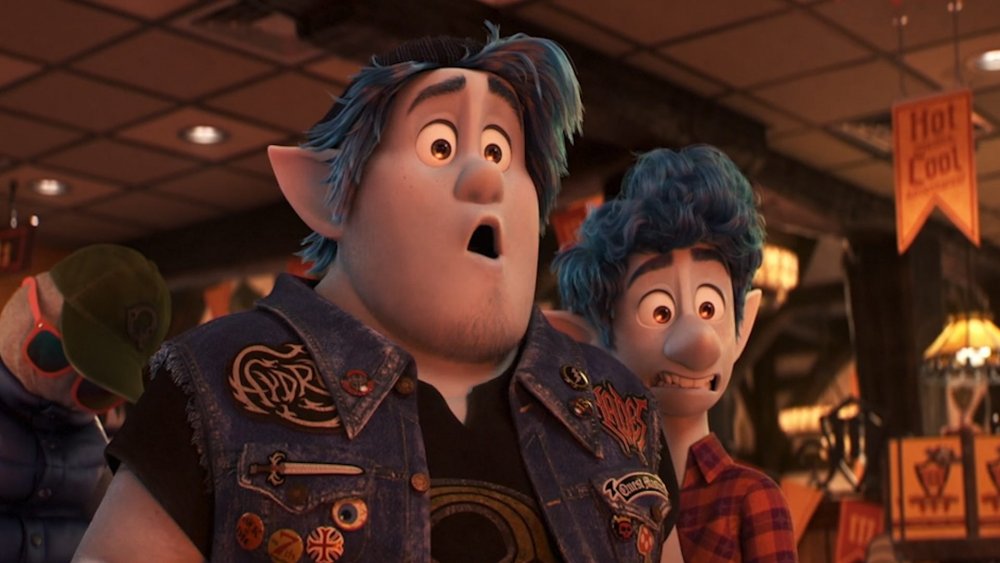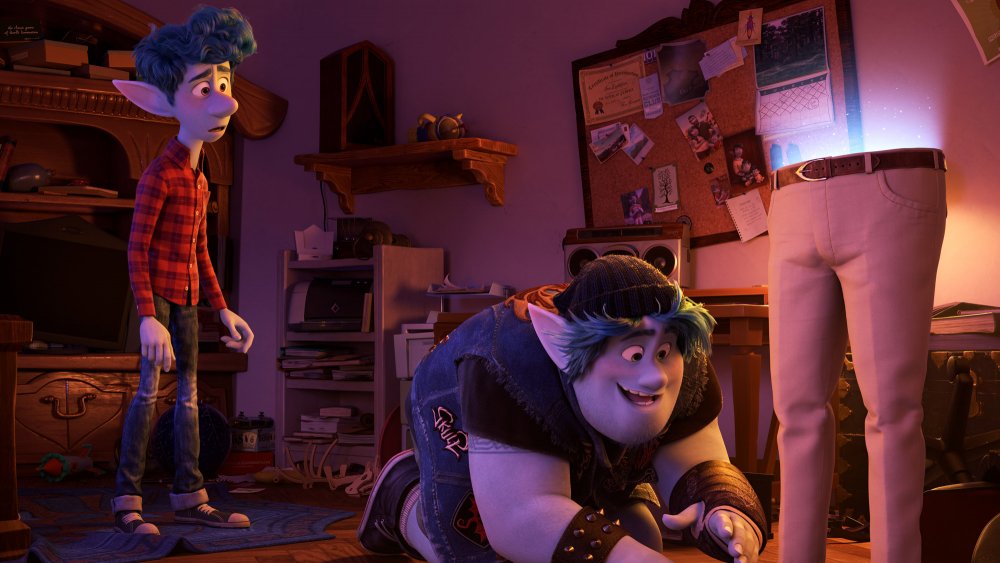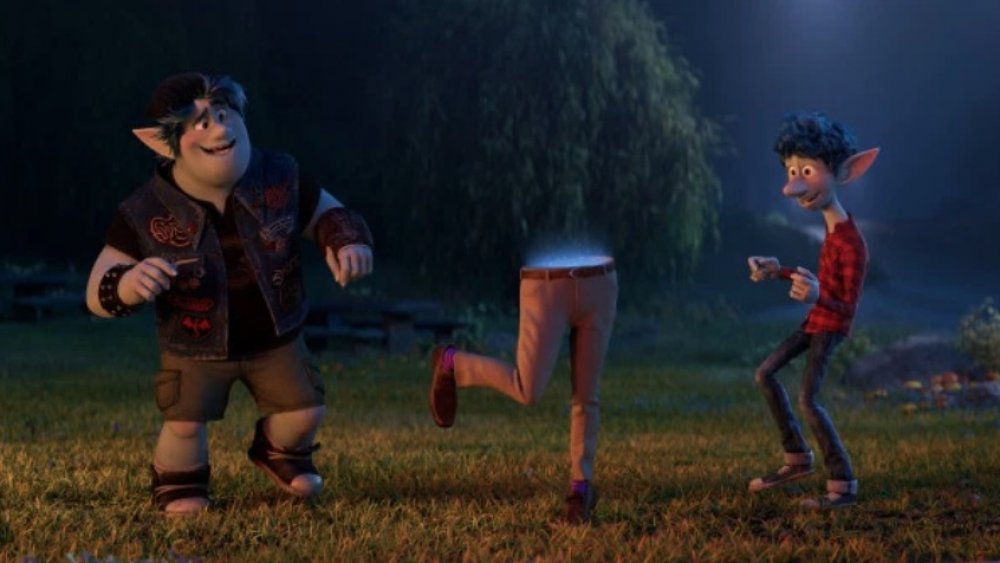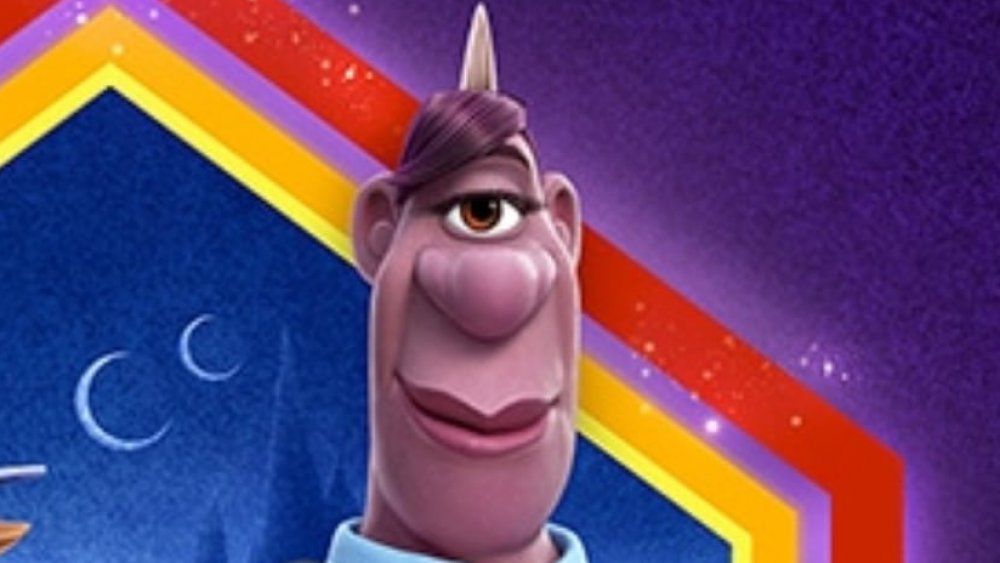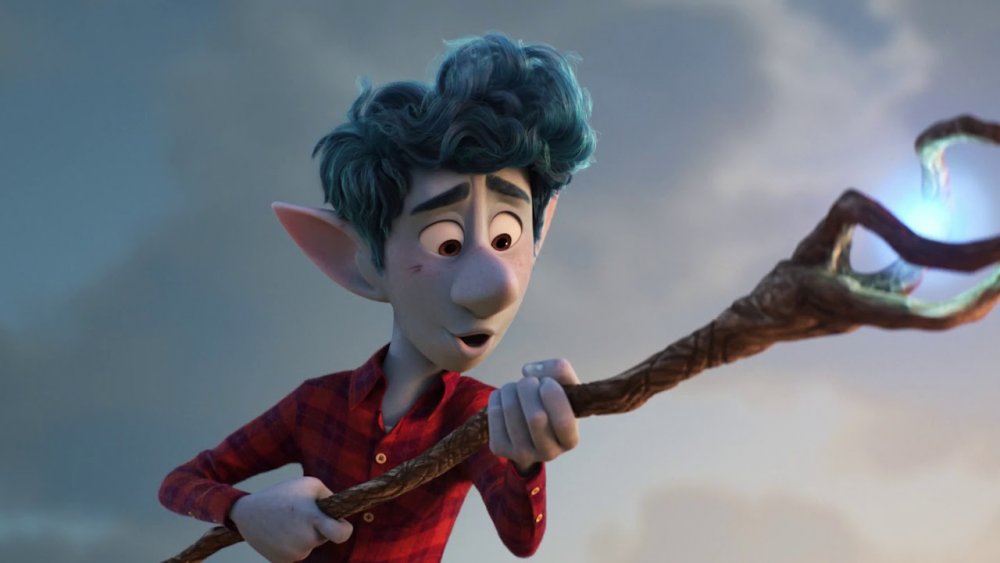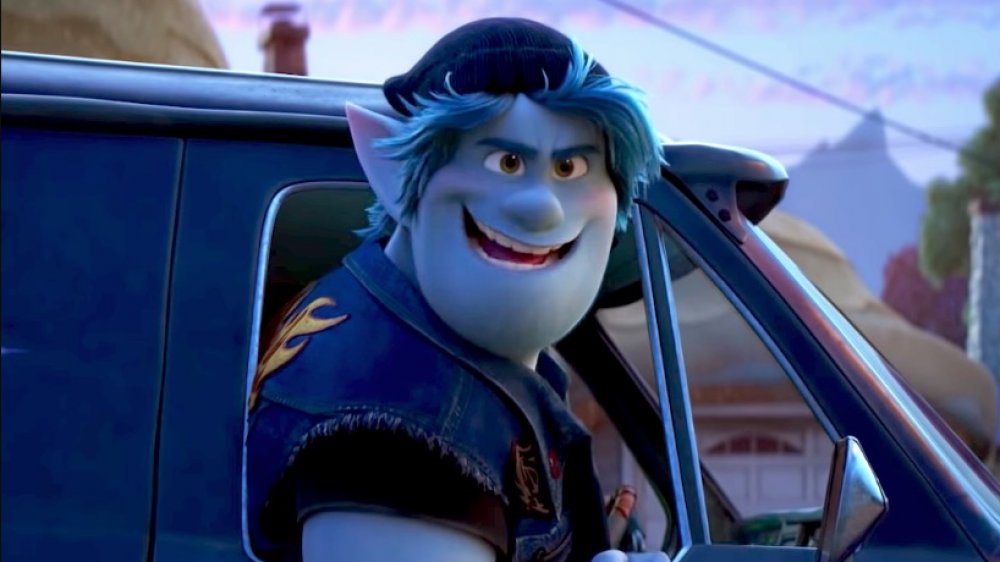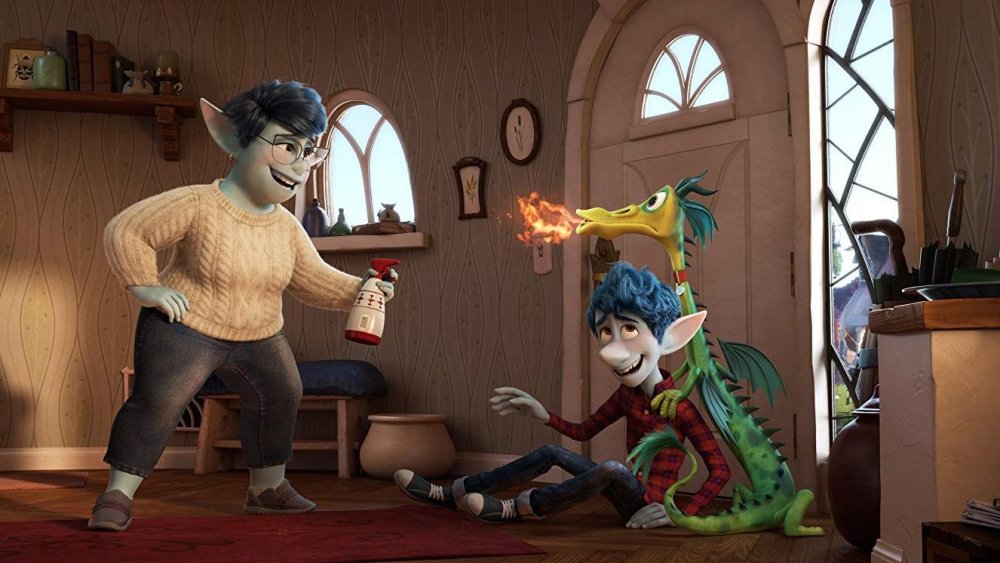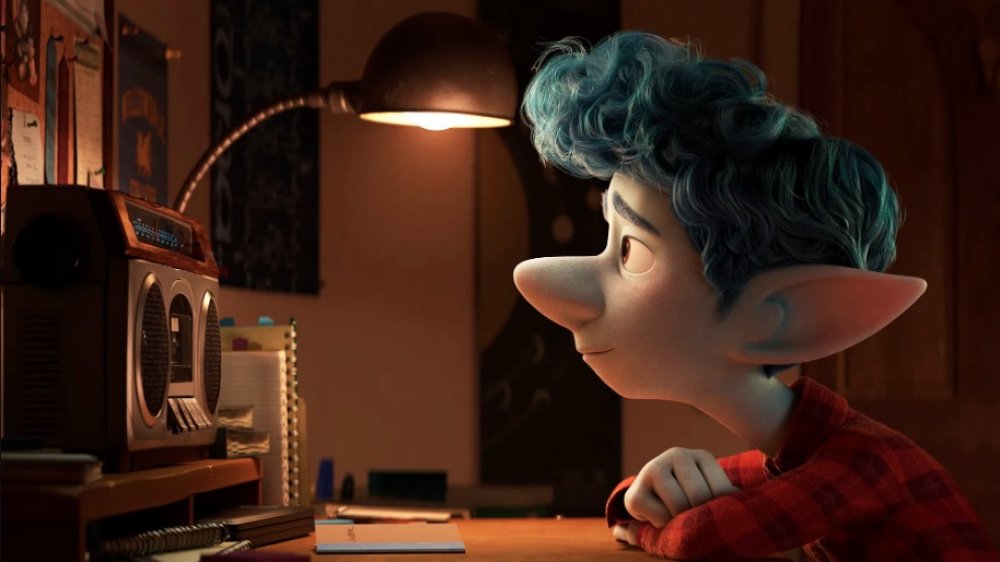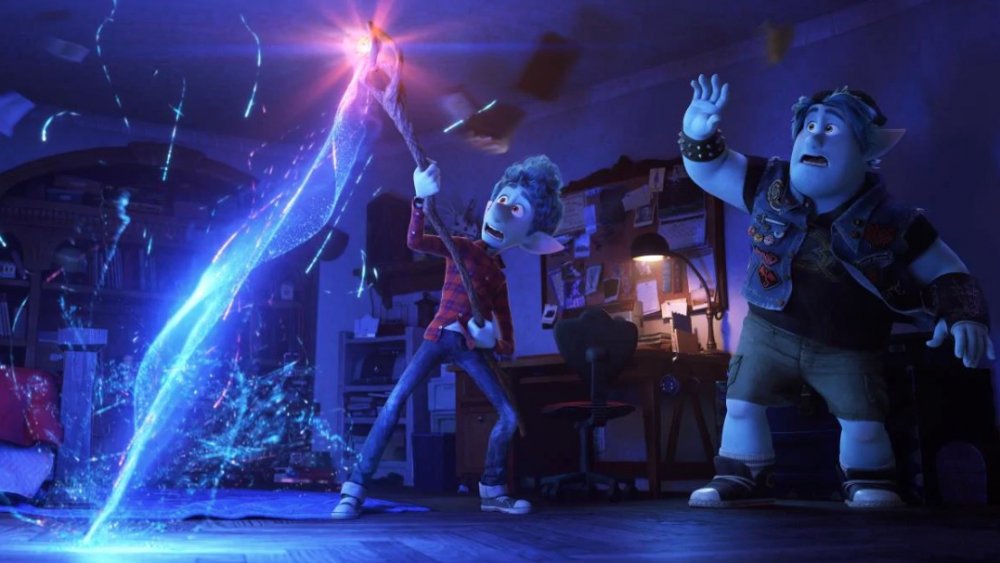Things Only Adults Notice In Onward
Animated movies might be predominantly made for and marketed toward children, but plenty of adults end up watching them, too. After all, it's a bit hard for any seven year old — no matter how much of Cars super-fan they might be — to buy a ticket to the latest animated release. Most kids see films with adults, and whether or not the latter audience enjoys those films is usually a roll of the dice.
Luckily enough for the more mature viewer, Pixar Animation Studios has spent years making films that are enjoyable to kids and adults alike. From Toy Story to Coco, the animation studio has become a favorite of moviegoers of all ages. Pixar's 2020 release, Onward, is no exception to the rule, building a magical and fantastical landscape of elves and kid-friendly adventure in between some pretty adult topics and jokes. Here are the things that only adults noticed in Onward.
They bring back the wrong half of dad
Onward follows brothers Ian and Barley Lightfoot as they try to bring back their dad from the dead for a single day in order to get to know him. Early in the film, they succeed at using the spell he left for them to bring him back... sort of. Ian only brings back the bottom half of their dad, leading to a quest to find a magic gem that can bring back his upper half before he completely fades away at sundown. As the two and a half men go about their urgent quest, there's plenty of Weekend at Bernie's-esque shenanigans and magical mixups to delight the kids. However, adults might find themselves wondering why the movie's main story is about two kids bonding with their dad's butt. As Uproxx's Mike Ryan so eloquently summarized: "This is a movie about two kids resurrecting their dead dad's crotch and it's just the WEIRDEST thing." As much as children's entertainment can often be bizarre and nonsensical, there's something truly distracting about Ian and Barley having intimate, emotional moments next to, and with, their dad's lower half.
It looks like a DreamWorks movie
While most kids likely aren't keeping exact track of which studios make their favorite films, adults generally need to do a bit more research. After all, if you've got to take little Timmy to the movies, there's a world of difference between a new Pixar release and the studio that brought you this. However, while Pixar's managed to stay steady with hit after hit after hit, even with the occasional criticism that they've overly relied on sequels, other animation studios have stepped up their game. Disney's non-Pixar studio brought the world Frozen and Tangled, while DreamWorks had a massive franchise hit on its hands with How to Train Your Dragon. Even as other studios have begun to match Pixar's artistry, Pixar movies still feel unique, with an incomparable style and personality that shines through.
Until Onward, that is. The 2020 movie feels like Pixar slapped a logo over a DreamWorks film, from the character designs to the dancing sequence in the middle. In fact, "Onward looks like DreamWorks" was a common refrain when the trailer first dropped. While it might not go so far as to have a dance sequence as the credits roll, that might not stop some adults from briefly forgetting which studio made Onward.
The first openly LGBTQ+ character in an animated Disney film
About halfway through Onward, Ian (Tom Holland) and Barley Lightfoot (Chris Pratt) get pulled over by some fantasy cops. One, a cyclops played by Lena Waithe, offhandedly mentions her "girlfriend's daughter." It's a small moment for a character that really only shows up in a very small scene — although the character technically shows up again in a second scene before the camera immediately cuts away. Still, adults will likely catch the implication that Waithe's character is gay. However, considering the insanely brief screen time for the character, and the even briefer mention of the character's girlfriend, it's unlikely that children will catch the meaning. It's wonderful that Disney is acknowledging the existence of LGBTQ+ people in the world of their films, but like the brief lesbian kiss in Star Wars: The Rise of Skywalker, these moments tend to be fairly insubstantial. Hopefully, the existence of people along a gender and sexual spectrum won't be something that only adults notice in films going forward.
Trust bridge
In one notable set piece, Ian and Barley have to figure out a way to cross a bottomless pit in order to continue their quest. Barley tells Ian about a spell that will let him walk on air by creating an invisible bridge that continues to exist as long as he truly believes in it. Ian is understandably scared at the prospect of crossing a bottomless pit with an invisible bridge, so the brothers compromise by tying a rope around Ian as he walks across. The rope falls away while Ian's halfway across, but he's already got the confidence to cross the bridge by himself and doesn't notice. Children might be on the edge of their seats hoping that Ian makes it across, but the whole scene will likely feel very familiar to the adults watching. The whole set piece feels a bit like team-building exercises like the "trust fall" or walking on hot coals — or the invisible bridge Indiana Jones has to walk across in The Last Crusade. They're activities meant to foster trust between individuals, and fittingly, Ian and Barley's relationship does improve a bit after their trust bridge incident.
Chris Pratt keeps playing man-children that are scared of his parents getting sick
For the majority of the runtime of Onward, viewers are likely empathizing with Ian's quest to get to know his dad. He's the character who seems most outwardly affected by his father's death, and he's the one who seems most eager to bring him back as soon as possible. Near the end of the film, however, Barely reveals that he has deep regrets over not getting the chance to say goodbye to his dad before he passed away. It's a touching moment, due in no small part to Chris Pratt's vocal performance. During the scene, the adults in the audience might realize that Pratt has a little practice playing an aging man-child struggling to get over the traumatic death of a parent due to a sudden sickness — after all, that describes Barley just as well as it describes Peter Quill in the Guardians of the Galaxy movies. Kids might not recognize that the characters in Onward are played by Spider-Man and Star-Lord from the MCU, but most adults will probably recognize that Pratt's carving out a very specific career niche for himself.
The mom is okay with missing dad
Ian and Barley's mom Laurel (Julia Louis-Dreyfus) has her own subplot in the film as she teams up with the Manticore (Octavia Spencer) in order to stop the curse that will be unleashed once the boys reach their final destination. However, considering the fact that her sons are trying to resurrect their dad for a day, kids might be confused as to why Laurel isn't more invested in helping them throughout the film. After all, surely she misses their dad too. Well, adults can likely connect the dots in the film. It's been at least 16 years since the elder Lightfoot passed on, and Laurel's been dating Colt Bronco (Mel Rodriguez) for long enough that he feels comfortable showing up at the house unannounced and worrying about her kids. Chances are, Laurel's already mourned and said goodbye to her late husband in a way that her kids couldn't have at the time.
The '80s atmosphere
Even though Onward is ostensibly set in the "modern" world with touchscreen cell phones, there's a distinctly '80s sensibility to the environment. Barley drives a van with a fantasy decal on the side, plays a game similar to Dungeons & Dragons, and both Ian and Barley listen to cassette decks instead of streaming music or even CDs. Even Laurel gets her exercise by watching a workout tape. Despite the nods to modern-day living, Onward seems to be set in a magical version of the '80s. As The Atlantic's David Sims wrote in his review, "Onward is informed by the '80s aesthetic of tabletop games, minivans airbrushed with heavy-metal album-cover art, and cookie-cutter suburban life, along the lines of recent throwback hits such as Stranger Things."
While plenty of kids wouldn't even recognize a cassette, nostalgic adults might recall their own days playing Dungeons & Dragons and listening to '80s power ballads — or at least watching films that reference those moments.
How did the splinter stay big?
Plot holes don't tend to matter much in a world that literally has magic in it. Just like the famous Simpsons joke, anytime you notice an inconsistency in Onward, the answer to how it happened is probably just "a wizard did it." Still, there are some rules to the magic in Onward, and one moment near the end of the film may leave adults scratching their heads.
During the battle with the dragon, Ian loses his dad's magical staff, but manages to make his own by enlarging a splinter that had gotten stuck in his hand earlier in the film. In the epilogue, Ian can be seen giving a talk to a group of students as he stands with his magical splinter staff. However, earlier in the film, it's established that Barley's accidental shrinking because of the spell misfiring is temporary. While kids are enjoying the epilogue, adults might be wondering whether objects made larger are also temporary, or whether that only applies to shrunk objects. Is the giant cheese puff raft that they rode still sitting in the river? If Ian can make things permanently larger, does this lead to a Cloudy With a Chance of Meatballs-type situation? Or does Ian just grow his splinter whenever he wants to use his staff?
